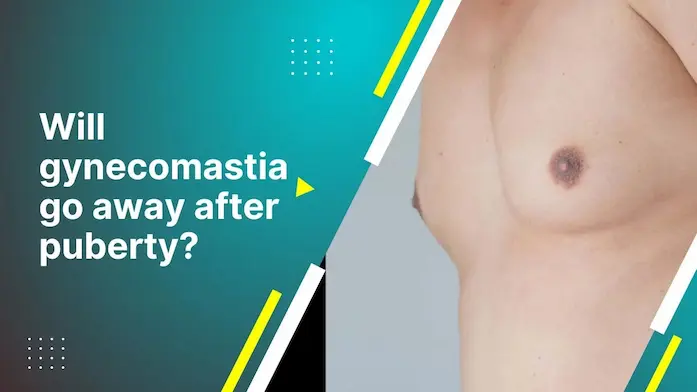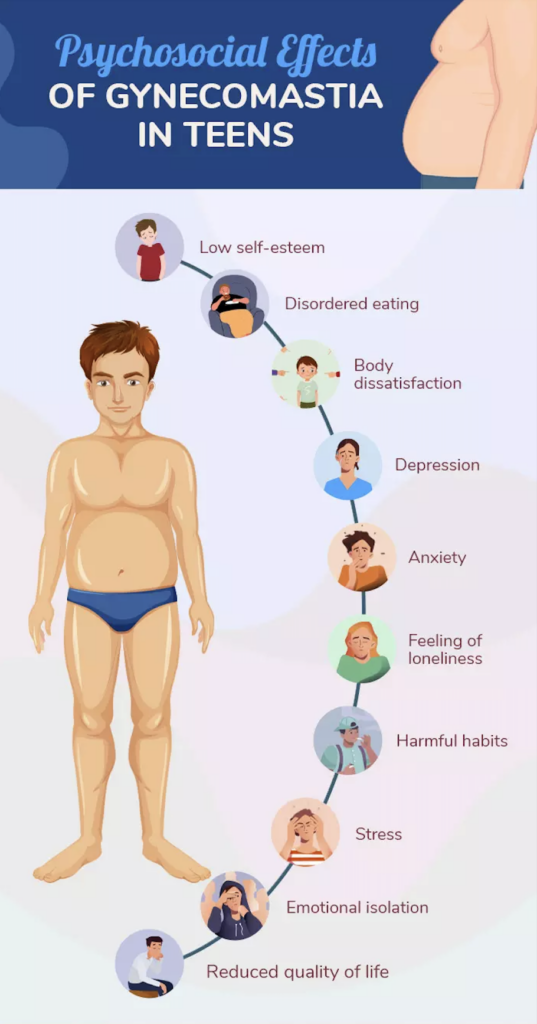
The most common presentation of gynecomastia is someone who developed it at puberty, and it persisted throughout their life. This is often referred to as idiopathic gynecomastia, puberty gynecomastia, adolescent gynecomastia, or, “I’ve had gynecomastia my entire life.”
Young boys go through a time in their life, during puberty, when their hormones change causing secondary sex characteristics like hair growth, a deeper voice and pimples. It also typically causes tissue growth behind the nipples that can become larger and tender BUT usually disappears after a year. Unfortunately, in some cases, there is persistence of this tissue (even growth) that eventually becomes established gynecomastia.
Pubertal or ‘adolescent’ gynecomastia
Also called (inaccurately, by the way) ‘congenital’ or ‘hereditary’ gynecomastia, this condition generally appears between ages 9 and 14 and may be seen transiently in as many as 30 to 50 percent of boys. In some cases pubertal gynecomastia recedes with age, but about a third of all patients will have breast tissue that persists into their young adulthood, and improvement can only be achieved through surgical excision. Because pubertal gynecomastia can spontaneously regress, it is our practice policy not to provide surgical treatment for this group of patients until they are at least 16 years of age.
The introduction and eventual decline of the male sex hormone testosterone can have varying effects on the male anatomy. A surge in testosterone or a sudden decrease in it can be responsible for structural changes to a man’s body. This is extremely evident during a boy’s adolescent ascension through puberty. From puberty, the sudden influx of testosterone can rattle the biological balance in his body and cause an endocrine reaction to release unequal amounts of estrogen. This can cause breast tissue to grow in excess and/or to swell up and protrude, sometimes severe enough to even resemble female breasts. Commonly, if generated by puberty only, the condition will subside over time and improve and regress as the rest of the endocrine system levels out. All too often, however, this is not the case and gynecomastia remains.
The “Puffy-nipples” form of gynecomastia, is fairly common among pubescent boys. affecting around 66% of boys going through puberty. Most cases occur between the ages of 13 and 14, although this condition can happen at any point during puberty. Needless to say, puberty is an extremely challenging time for young boys as many of them go through physical and emotional changes that affect their development. At this age, gynecomastia can affect a teenager’s self-image and confidence and even their general health as they withdraw from physical and social activities, so it is important to consult with a gynecomastia specialist in Boston.
Persistent gynecomastia during adolescence may require surgical intervention to alleviate both the physical discomfort and emotional distress experienced by these teenagers. At the Boston Gynecomastia Specialists, we specialize in providing comprehensive care for adolescents dealing with gynecomastia. Our team of dedicated specialists has the experience and expertise to address the unique concerns and challenges faced by these young individuals. With a focus on compassion and treatment customization, we strive to offer the best solutions to ensure optimal outcomes for our adolescent gynecomastia patients.
Gynecomastia Surgery for Adolescents
The assessed underlying cause of the enlarged breasts helps determine the most appropriate procedure to address the gynecomastia. The enlargement could result from excess fat, enlarged glandular tissue or a combination of both.
When fat is the cause of the gynecomastia, liposuction is used to remove the fat and contour the breasts. This would involve using one or two small incisions placed in strategic locations. A thin tube, known as a cannula, would be inserted through the incisions to remove the offending fat with suction. If excess, enlarged breast tissue is the reason for the gynecomastia, then surgical excision of this tissue will be necessary. For this procedure, Dr. Ishoo would make an incision along the lower half of the areola and precisely remove the offending tissue. True “Puffy-nipples” gynecomastia can also be treated with the minimally invasive technique of PEXsculpt developed by Dr. Ishoo which avoids the chest incision and opening of the breast tissue and the resultant scars. This technique also allows for better contouring and faster recovery for the appropriate individual.
When the cause of the enlarged breasts is the result of both excess fat and breast tissue, then a combination of both liposuction and direct surgical excision would be needed to achieve the desired goal. Finally, if there is also excess, lax and sagging skin, this can be removed at a later time to allow healing and skin contraction, avoiding unnecessary trauma and scars in most cases.
At the Boston Gynecomastia Specialists, surgical treatment of adolescent gynecomastia, especially “Puffy nipples” is safely performed under local anesthesia as an outpatient, which expedites recovery and return to school and activities.
At the Boston Gynecomastia Specialists, surgical treatment of adolescent gynecomastia, especially “Puffy nipples” is safely performed under local anesthesia as an outpatient, which expedites recovery and return to school and most activities in days.

Frequently Asked Questions
You may be just starting your research and have a lot of questions about adolescent gynecomastia and how we may help with your adolescent gynecomastia treatment decision.
What Causes Gynecomastia in Teenage Males?
During puberty, the male body experiences hormonal changes and oftentimes irregularities. A sudden imbalance of testosterone-to-estrogen ratio can produce gynecomastia, which can last anywhere from 6 months to 3 years, or in some cases longer. In these cases, consulting with a board-certified gynecomastia specialist can help address these long-term symptoms that do not disappear over time.
How Long Does Gynecomastia Last During Puberty?
In most cases, gynecomastia can last anywhere between 6 months and three years. If the symptoms persist for more than two years, gynecomastia surgery may be a positive alternative to help address the enlargement of male breasts in teenagers.
Can You Get Rid of Gynecomastia?
Gynecomastia disappears naturally in most cases, but it can produce prolonged effects in some teenagers. Moreover, there are many cases where fat deposits are left after the gynecomastia has vanished, which still produces an unwanted look. Gynecomastia surgery can help eliminate symptoms of this condition, including fat deposits that are often left afterward.
When should I seek medical advice for adolescent gynecomastia?
If gynecomastia persists for over two years, is accompanied by discomfort, tenderness, puffy nipple discharge, or significantly impacts emotional well-being or self-esteem, it’s recommended to seek consultation with Dr. Ishoo at the Boston Gynecomastia Specialists. Dr. Edwin Ishoo has performed hundreds of male breast reduction surgeries on preteens and teens, and it is considered a safe procedure with a short recovery time and the results are long-term.
You may be a candidate for male breast reduction surgery if:
- You are between about 12 and 18 years of age and have enlarged tissue in one or both breasts
- Are unhappy about your enlarged breast tissue and feel it affects your confidence in your self-image or social life
- Your breast tissue has been stable for at least two years and is no longer growing
- You are generally healthy and emotionally mature
- Your gynecomastia is preventing you from engaging in sports or social activities
Is the Recovery Painful?
Young men are usually strong and healthy, and they tend to heal and recover quite rapidly. Soreness after the surgery is normal and is easily treated with painkillers. You should be able to return to school within 2-3 days, and within 4 weeks you should be able to engage in your regular exercise or sports again.
How Much Does Gynecomastia Surgery Cost?
Our gynecomastia surgery The cost of a gynecomastia procedure varies depending on your location and the physician’s expertise. To get an accurate estimate, the best choice is to consult with a seasoned, double board-certified specialist that can assess your particular case and help determine the best course of action.
How Long Do the Results of Teenage Gynecomastia Last?
In gynecomastia cases where the condition was caused by the onset of puberty, the results of the surgery are usually permanent. Teens that have gynecomastia surgery do not typically experience symptoms after the procedure, except for cases of excessive weight gain or when taking medication known to produce male breast enlargement.
What Risks are Associated with Adolescent Gynecomastia Surgery ?
Some of the potential risks and temporary side-effects associated with teenage gynecomastia surgery include, but are not limited to:
- Mild pain during the recovery
- Minimal chance of infection
- Visible scarring
- Breast asymmetry
- Fat necrosis
Want to Learn More?
If you think you may be a candidate for gynecomastia surgery, you should strongly consider scheduling a consultation with Dr. Ishoo to explore your options and help you regain confidence in your appearance.. Dr. Ishoo will listen to your concerns and goals, thoroughly examine you and then determine exactly what course of action would be in your best interest. Our dedicated and caring staff is committed to providing compassionate care and guiding you through each step of your treatment journey.
_____________________________________________________________
The Boston Gynecomastia Specialists is the premier Greater Boston Gynecomastia Center of Excellence. Our primary focus is on providing outstanding care throughout every step of your journey, from the first consultation to your full recovery. We recognize and appreciate the confidence you have in us and are unwavering in our commitment to maintaining the utmost level of patient care. Led by Dr. Edwin Ishoo, a highly skilled, board-certified surgeon with expertise and over 30 years’ experience in Male Breast Reduction, our dedicated team is fully committed to ensuring the best possible surgical outcomes tailored for each individual. Recognizing that every man is unique, we personalize our approach to meet your specific condition, needs and expectations. We welcome you to take that first step to achieving the transformation you have been imagining and contact the Boston Gynecomastia Specialists, the leading Gynecomastia Center in Boston, to meet with Dr. Ishoo for your personalized, in-person consultation and have your questions answered. Let us take the gynecomastia concern off your chest in a day and off your mind forever!


